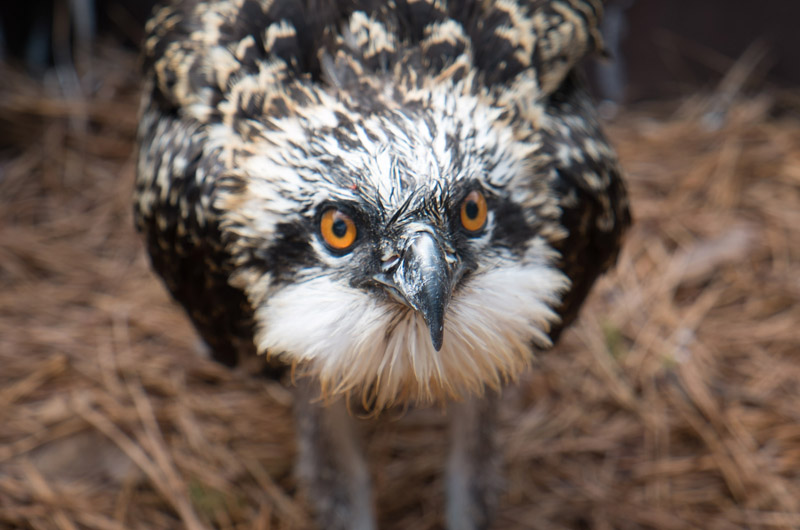Noted naturalist Gus Ben David has handled everything from gigantic constricting snakes to enormous birds of prey, but the latest creature under his care is significantly less intimidating and quite a bit more endearing: a baby osprey recently rescued on Chappaquiddick.
Mr. Ben David has been feeding and housing the small raptor since it was delivered to him earlier this week by Dick Jennings, who conducts an annual survey of the osprey population on the Island.
“It’s just at the stage of being able to pick at a fish carcass,” said Mr. Ben David of the osprey orphan. “I’m still hand feeding him, but in about a week he’ll be feeding on his own. He won’t be flying until about the third week in August even if everything goes well.”
Mr. Ben David keeps fish carcasses, donated by Coop’s Bait and Tackle and Edgartown Seafood, on hand in his freezer. He thaws and fillets the fish, hand feeding the osprey one bite at a time.
The osprey had apparently fallen off a pole where it was nesting on the Self property on Chappaquiddick, meaning that it had survived a 30-foot drop, then was luckily rescued before it fell victim to predators such as dogs or skunks.
“They’re amazing birds,” said Mr. Ben David, who also led an effort decades ago to put up the osprey nesting poles that are now a familiar sight around the Island. “They have some incredible physiological factors that allow them to survive.”
Those factors include powerful eyesight and strong talons that can be used to spot and scoop up fish. The baby osprey in Mr. Ben David’s care has little need for either at the moment. But when the time does come, he said the osprey should instinctively know how to catch fish on its own.
The former owner of the World of Reptiles and Birds Park and former director of the Felix Neck Wildlife Sanctuary, Mr. Ben David has extensive experience working with birds that have been orphaned or found in dangerous situations. He is the only licensed bird rehabilitator on the Island and works with all the conservation groups. “If somebody finds an injured osprey or a red-tailed hawk or a golden eagle, then I’m notified,” he said. “I may be the point man, but I’ve got everyone supporting me . . . I always say, give someone else credit!”
Yet as he spooned tiny bits of filleted fish into the baby osprey’s mouth, it was not difficult to see how Mr. Ben David has been viewed as a savior of birds, especially migratory waterfowl, over the years.
“Something always happens,” he said. “And I’m always here.”








Comments (7)
Comments
Comment policy »